Yevhenia Bardiak: There will be films — despite darkness, provocations, and government resistance
Yevhenia Bardiak: There will be films — despite darkness, provocations, and government resistance
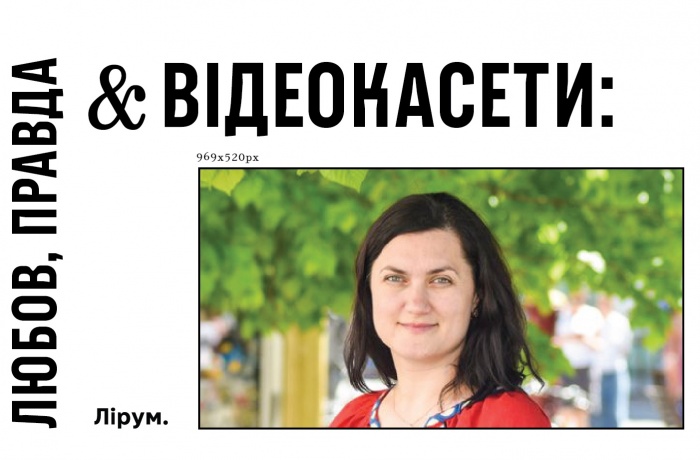
We continue to collect memories about the history of the Travelling Festival’s 20 years from different heroes and heroines from all over Ukraine, and from different time periods.
In this context, we must also mention another important anniversary: 10 years since the Revolution of Dignity. We recall that autumn and winter in our minds, reflect on the events that took place. We want to share a special story that happened during the festival in 2013. It was the first case in the festival’s history when the authorities, the Security Service and law enforcement started to interfere with the screenings of some films. Read this article about how our regional coordinators overcame all the obstacles.
We talked about this with a person whom the Docudays UA team remembers warmly and frequently. Yevhenia Bardiak is a public figure and the Head of NGO Young Prosvita Prykarpattya. 15 years ago she launched the Travelling Festival in Ivano-Frankivsk, and every year she added new cities, towns and villages in her region whose residents had a chance to see documentaries about human rights. Now Yevhenia Bardiak is a councillor of the Ivano-Frankivsk Regional Council, so she passed her experience and responsibilities in organising the Travelling Festival to her colleague from Young Prosvita, Tetiana Pihurska.
Please share the story when the government opposed your screenings in the city? Legends still circulate about the screening on a building facade…
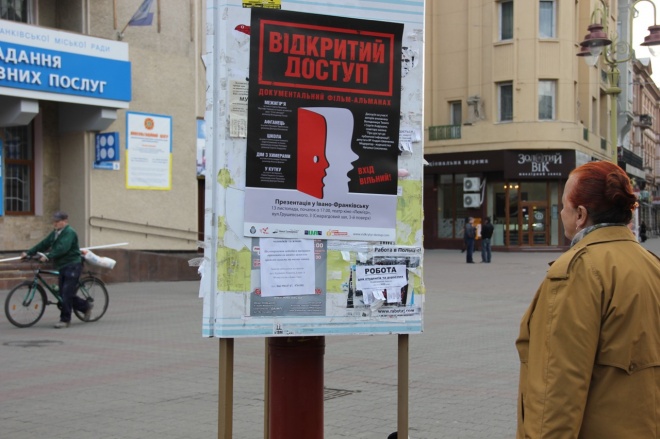
A photo from the archive of the Travelling Festival in Prykarpattya
It was the autumn of 2013. My son was four months old at the time. There was a surge of civil activism in Ukraine, and I could not stay away. We organised screenings of the Travelling Docudays UA, and the programme included the film almanack Open Access. The events shown in the almanack unfolded after the Law “On access to public information” came into force; the adoption of this law had been fought for by NGOs, journalists, and experts for several years.
The films in the almanack include Mezhyhirya. In it, journalists investigate how hundreds of hectares were stolen from the state using corruption schemes and turned into private property of the 4th president of Ukraine, Viktor Yanukovych.
We had an extensive event schedule and invested so much effort in organising, advertising, and technical equipment for the screenings. And then suddenly unexpected obstacles emerged at various locations. And not only in places where we planned to show Mezhyhirya, but practically everywhere where the Travelling Festival was scheduled. Once we came to show a film about kids, but all the people with whom we made arrangements about the event were out of reach. The venue door had a sign on it: “No power, sorry, all screenings are cancelled.” The next time the situation was different: there was a crowd of “titushkas” at the entrance to the cinema, a group of young guys in tracksuits, and there were representatives of the Security Service. We came with a lawyer, because we already realised that there would be a provocation. He filmed everything, and we were asked, “Why are you filming?” We answered, “The camera is our protection.”
Then our screenings at the university were cancelled. We had a representative of the Human Rights Office with us. We saw that “people in black trench coats” entered the building before our visit, and then they left and a guard passed us a message about the cancellation of the event.
At another cinema, we had a signed agreement and prepaid rent for the venue, so there they had no legal right to cancel our events. And there were power outages for exactly 3 days in a row when we were supposed to have screenings. Then we decided to move the event to the Prosvita People’s House and invited everyone there. Prosvita was located right across the street from the cinema where there was another “power outage.” But even here we were immediately visited by the police with dogs and with an announcement that “there is a bomb in the building, everyone out, there will be no films.”
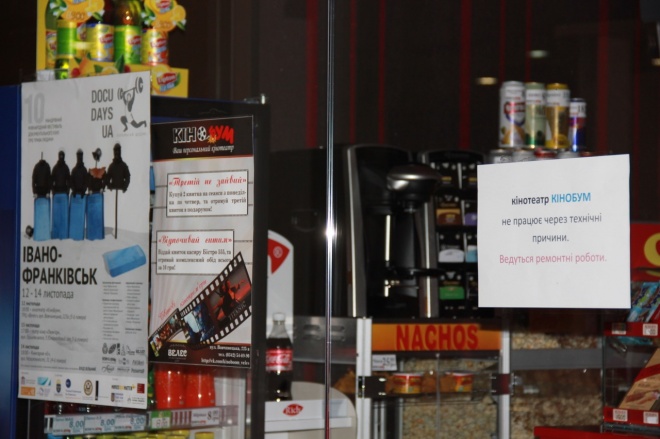
A photo from the archive of the Travelling Festival in Prykarpattya
All these days, we felt fear and did not fully understand how to act in these situations. We asked the local media for support. They helped us cover all the events that happened with the screening cancellations. And that screening at the People’s House was attended by quite a lot of people, because everyone knew what was going on and what the government was doing. People were concerned about it, they all got involved on that day, activists came and brought a generator, speakers and a projector. And when we were told another lie about the bomb in the building, we went outside and screened the film on a school building facade. While the police were “looking for bombs,” hundreds of people, including their colleagues from the police who were stationed around Prosvita, were watching the film. Everyone who was passing by became an audience member.
You could think that that would be the end of it, but no. Wherever we planned to show other films, everywhere was either closed or had a power outage. The only venue that didn’t cancel our screenings back then was our regular partner, the Ye Book Store, even though they said that they were also visited by the Security Service. Since then, the Ye Book Store is truly a social business in my eyes which aims to support civil society, democracy, and openness. Our films were also demonstrated at the Medical University. There we watched a film about the neurosurgeon Henry Marsh, a doctor who saved hundreds of Ukrainians back then and still actively helps our soldiers.
Those events were followed by rallies for European integration. On 1 December, the activists were beaten up in Bankova Street. Provocators came to our events and tried to disrupt the screenings. A camera helped us again back then, we filmed everyone, took pictures, and the provocateurs realised that we could bring them to responsibility for violating our rights. These events in Ivano-Frankivsk were covered by all honest media in Ukraine, and it really inspired people to fight for their rights.
As I look back on those times, I must state that, sadly, most officials who created obstacles for the festival (because they were “concerned about their positions”) are still in power. Back then I realised for the first time that even in my patriotic Ivano-Frankivsk, those who are against human rights and democracy also feel comfortable and continue to “work.” It showed me that there were no safe spaces, we needed to create them for ourselves. And activists must go into politics, into government structures, and create new spaces based on the principles of democracy and respect for human rights.
In January 2014, we already reoriented all the activities towards the Maidan, and then the ATO.
Please tell us how everything with the Travelling Festival began personally for you? In what year, what Ukrainian region, what memorable place?
In 2008, I was at a human rights training in the Kyiv Region, and that’s where I learned about the Travelling Festival. I was really enthusiastic about everything new. I contacted the festival’s founder, Gennady Kofman, who really loves cinema and his job, he could talk to me on the phone for hours. It really helped me figure out how to better organise the festival and specific events. That was when the Young Prosvita team and I made the decision to launch the Travelling Festival in Ivano-Frankivsk, it was the 5th year of Docudays UA. We had no funding whatsoever for the first screenings, but we were able to arrange things with a local cinema. There were few public events in the city at the time, most people did not understand what public activity was, what documentary films were.
What festival stories from different years are the most memorable for you?
I have so many memories, if we count that the first Travelling Festival in Ivano-Frankivsk was in 2008, this is going to be the 15th Festival!
Maybe some will think this memory is not very significant, but it is important to me. We screened films about the cycling movement in the Czech Republic and invited an association of Ivano-Frankivsk cyclists to the conversation, and we talked with them about the power of community, the fight for their rights: bike lanes, respect for cyclists in traffic. Back then our cyclists did not have a good understanding of these things, they knew nothing about advocacy campaigns, did not realise that you need to defend your rights even if you’re just a cyclist. Back then the city had no adjustments at all for moving around the city on a bike. But gradually cyclists began to understand what we were talking about, and they became more active. Now infrastructure is already changing in the city. Until people start advocating for their rights, there is no progress, in my opinion.
How hard it was since the beginning and during your work on the festival to explain to people what human rights were and how each of us can defend them?
It’s only now that human rights are discussed so broadly, and that’s a good thing. But back then, 10 or 15 years ago, it wasn’t a trend yet. For me, the luminaries in this field were people from the National Ukrainian Education Campaign “Understanding Human Rights,” who later founded the Human Rights Education House in Chernihiv.
Docudays UA is another educational instrument for dialogue about human rights. The films I see there are very instructive. We should all develop the skill of watching documentaries. At first I was very enthusiastic about the event I wanted to organise in my hometown, I was desperate for new things, and only later, in a year or two, I developed a better understanding of documentary films. These films expand your worldview, help you understand the world better, they’re very good at developing critical thinking skills. You start reaching beyond your usual bubble and understand other people better. I remember films which really changed my mindset. When the full-scale invasion began, the situation in our country did not feel shocking to me, in a way I was prepared. Because when I watched documentaries earlier about wars, ethnic conflicts, for instance, in Burma (now Myanmar) or in Sri Lanka, where the government slaughtered one of the ethnic groups, even then we in the audience saw that the UN did not help these countries at all. Even back then I realised that this institution and most other international organisations were ineffective. Later I visited Bosnia and Herzegovina, and when I talked to the locals who recalled the events of 1995, I also learned about their disappointment in the UN.
Very often critical conflicts in different countries follow the same script which can be observed when you watch documentaries. It was the case when the Maidan began in 2014, and before that we at the Travelling Festival screened a film which was called Enough! To Freedom! about Belarus. The key events of the Revolution of Dignity were happening exactly at that time, and in the film we saw the same things as in our reality: suppression of rallies, brutality against activists, mass incarcerations and so on.
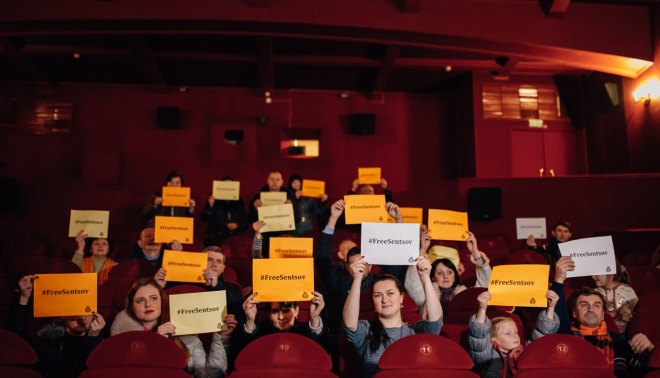
A photo from the archive of the Travelling Festival in Prykarpattya, a demonstration in support of Oleh Sentsov
When an audience member sees true stories through cinema, they can look at the world critically and see different aspects of the situation, because the news often distorts information or simply takes important things out of the message and keeps silent. A friend of mine once visited Sri Lanka, and after her impressions from the trip, I realised that the world doesn’t know much about what is going on in many countries on the inside, what conflicts and precedents of human rights violations happen there. Because a tourist goes somewhere and sees a piece of paradise, even though the local government and the global community don’t show the real suffering, blood and pain which people experience there every day.
We watched films about dictators destroying their peoples but remaining members in the UN and other international human rights organisations and participants in the global dialogue about international democracy. After these paradoxes you see in documentaries, you develop an understanding that many things are not as they seem at first sight.
I love films about history which show what has happened in the world and in Ukraine or the events whose consequences we are dealing with now. Films about people’s experiences. About fighting for human rights. Because these films can give you ideas for your own projects to defend human rights.
In your opinion, do mechanisms for defending human rights work today in government institutions, in our everyday life, in culture?
I believe that the government, even the most democratic one, always has an interest in violating human rights, because the fewer rights citizens have, the easier they are to control. But people must oppose this and nurture civil society. The only power lies with the people, but right now few people realise this. If, for instance, a community is united and active, the government will reckon with this community. You should be interested in the basics of local self-government, because until there is a critical mass of people who know what it is and how to implement it in practice, officials will manipulate. In this context, documentaries are an important tool that helps people learn.
How can we implement human rights mechanisms today? Both at the level of legislation and in our everyday lives?
Talking and learning about human rights matters. The more people know their rights, the more intensively they will be able to defend themselves. I joined the community of human rights advocates because I felt the injustice around me and I realised that we still have a lot of work to do in this field, and first of all we must create a dialogue.
Has the Travelling Festival affected your decisions in your main professional field in any way? Or your private life?
The Travelling Festival helps us establish contacts, we have a good network of contacts all over Ukraine with various organisations and activists. For instance, in 2019, we did an engagement project for Mariupol residents, and back then we were helped by our colleague, human rights advocate Hryhoriy Kurachytskyi. Back then he was the regional coordinator for Mariupol, but now he lives in Dnipro and organises the Travelling Festival there. Hryhoriy recommended to us the local creative groups from Sartana near Mariupol. All these 30 people came to us to perform at the Beehive of Cultures festival. There was a very warm event, and after that we showed Prykarpattya to our guests.
How has the human rights dialogue at the Travelling Docudays UA affected your vision of the implementation of policies (legislative, executive, judicial, or in other legal spheres) in Ivano-Frankivsk?
In general, all of my civil activism which I’ve been doing since 1999 now helps me in politics. Because as a councillor in the Ivano-Frankivsk Regional Council, I talk to voters in their own language. My job always involved communication with people, grassroots initiatives and defending the interests of communities and specific people. If we imagine a “typical official” from the previous decades, they do not have these communication and empathy skills. Today everything is changing, there are young actors in the field of politics. Our voters also develop high-quality demands for government representatives. For example, when people coming from the civil sector with new approaches to work compete in elections, other councillors also cannot help but change, because otherwise they will lose. Modern politicians must know how to talk, develop dialogue with society, have a public social media page, defend people’s rights, and therefore be a representative of the people that elected them.
Today I have quite a lot of requests from communities, and they’re all about human rights: defending people with disabilities, supporting people in the military, low-income people, internally displaced people. If people suffer from illegal decisions, I cannot be silent. Even if a situation is beyond my competence, I write a councillor request for information from other government structures to let them know that I am interested in and monitor this particular case.
In my work, a huge role is played by support from other activists. Including activists who are not from my region. Activists from other regions are usually independent from the local context of Ivano-Frankivsk, from the pressure of local “underwater currents.” Support for one another in the public space is very important.
Please tell us more about your team from Young Prosvita who are currently conducting the Travelling Festival in Ivano-Frankivsk.
Today the festival is organised by Tetiana Pihurska, who is a responsible person with a lot of interesting ideas. For example, in the first years, when she began working with the Travelling Festival, she organised a screening of a documentary about transit at a trolleybus garage. Tetiana knows how to build communication with different partners and NGOs. This year we have a lot of interesting locations where screenings will take place. In the past few years, Young Prosvita tried to show films in communities more, in towns and villages, because there people are very eager for events, documentaries, meetings, discussions, it’s important to build a dialogue with them about their rights. In addition, the Travelling Festival in Prykarpattia communicates a lot with internally displaced people, demonstrates films at the Luhansk Hub, Mariupol Hub, and the festival opened with the film Kherson Unconquered at the Kherson Hub.
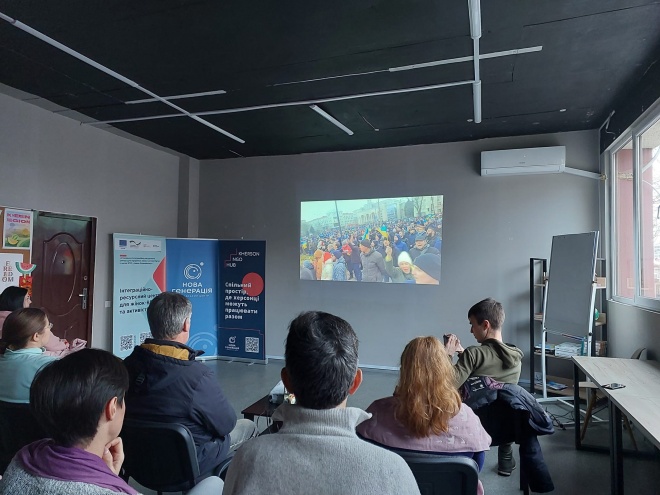
2023, a screening of Kherson Unconquered
How do you see the image of the future for the Travelling Docudays UA?
I remember 2013, the opening of Docudays UA in Kyiv. The festival in the capital invites regional coordinators from all over Ukraine every year, and that year we were so happy to meet. I was impressed by the festivity of the event, the musical performance by Dakh Daughters, the unusual location. And in 2019, there was a great opening with a laser show and electronic music which I also remember well. The festival grew better every year, and I’m sure it will continue to grow.
Interestingly, due to all the events that the festival has been through — the Maidan, COVID, full-scale invasion — we no longer think about the Travelling Docudays UA as ceremonies and concerts. Today it’s a year-round platform which creates and stores a documentary film library, has a strong network of contacts all over Ukraine, and does its job which brings our Victory closer. Many of our colleagues have lost family, their homes, some have died defending our Homeland. Our friend, famous human rights advocate and moderator of many Docudays UA festivals Maksym Butkevych is now in captivity, and we are fighting for the world to hear his story and help rescue Maksym. Today it is not just about the festival but about a real instrument that can help people defend their rights and defeat the enemy at all levels, both internal and external. The Travelling Docudays UA is an important spiritual heritage which we are passing down to the future.
The conversation has been recorded by Ksenia Opria.
The 20th Travelling Docudays UA is held with the support of the Embassy of Sweden in Ukraine, Embassy of Switzerland in Ukraine, US Embassy in Ukraine. The opinions, conclusions or recommendations do not necessarily reflect the views of the governments, charities, or companies of these countries. Responsibility for the contents of the material lies solely on its authors.












